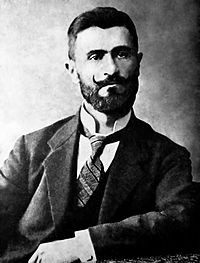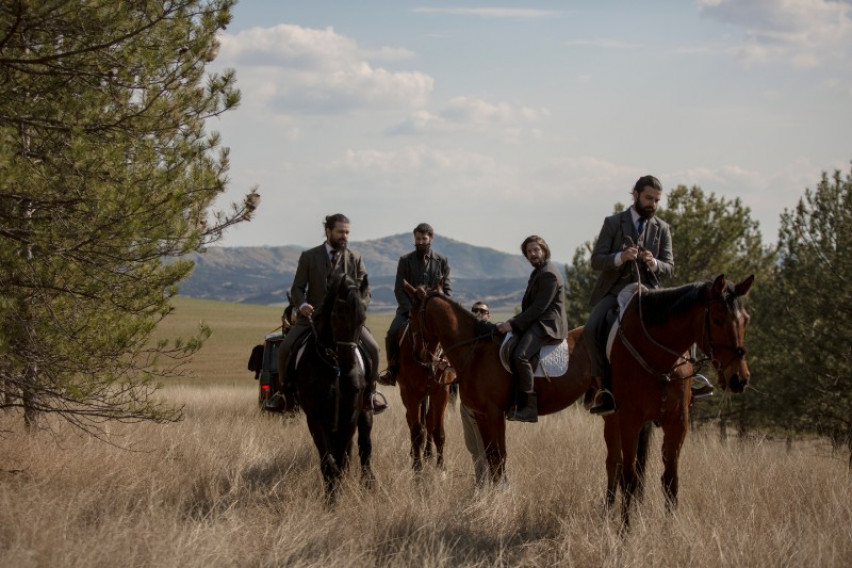The latest song by Martin and Stefan Filipovski, better known as Next Time, was viewed by 300.000 people in mere two days on Youtube making it one of the most popular Macedonian songs.
The two brothers performed “Nesto Ke Te Pitam Babo” (Tell me this grandma) a popular folk song about legendary VMRO commander Todor Aleksandrov. The song portrays a questioning of an elderly lady by a Turkish officer who demands that she reveals which Macedonian fighter was hiding in her house. The defiant old lady responds that yes, she harbored Todor Aleksandrov in her home, and he left leading his soldiers up Mt. Pirin.
Their flag was black and red, and the words on it said ‘Death or Liberty’. Death or liberty for Macedonia, the iconic lyrics end.
Next Time and director Ognen Shapkovski prepared a typically powerful and emotional video, portraying the VMRO komiti riding up a mountain, and the questioning of a woman which more closely resembles the Communist era persecution of Macedonian patriots than the Ottoman tactics. A theater in Skopje was packed on Monday evening for the promotion of the video, and the comparison with the on – going mass arrests of opposition activists by the Zoran Zaev regime resonated strongly with the audience. Social media are buzzing with people asking where they can download the song for a ringtone. And the regular daily press conference by SDSM spokesman Kostadin Kostadinov in front of the VMRO party headquarters in downtown Skopje was drowned out today when someone played the defiant tune at him.

The song also resonated with Zaev loyalists, but with opposite effect. His Minister Damjan Mancevski gave a typical answer for a left wing politicians, implying that Todor Aleksandrov was Bulgarian. Born in Stip, in Macedonia, Aleksandrov spent his life fighting for an independent Macedonia in its Vardar, Pirin and Aegean constituent parts, and fought through the Ottoman decline, the Balkan Wars and the First World War. Aleksandrov also frequently used the support offered by the Kingom of Bulgaria, to fight both Ottoman and Serbian forces in Macedonia. What most riles left wing Macedonians like Mancevski against Aleksandrov is his refusal to subordinate the Macedonian national struggle to the then fashionable left wing revolutionary movements. He initially signed by then rejected the 1924 May Manifesto proposed by the USSR Comintern.
Aleksandrov also wouldn’t shy away from ordering assassinations, including the brutal murder of Bulgarian Prime Minister Aleksandar Stamboliski and killing of Georce Petrov, but also from pure terror tactics such as the use of donkeys packed with dynamite to as bombs detonated among Turkish civilians to avenge Ottoman killing of Macedonian villagers.
But it is his steadfast insistence to reject a lurch to the left and his frequent attacks on left wing propagandists that made Aleksandrov such a bete noire for the Macedonian left, that left wing historians would declare him a pro-Bulgarian fighter throughout the period of Communist rule. The same pro-Bulgarian label was frequently slapped on all non-Communist Macedonian patriots who wanted secession from Yugoslav and an independent country. And while the Zaev’s Government, where Mancevski sits, accepted a treaty under which Bulgarian historians can determine which historic figures should be celebrated jointly with Macedonia, their SDSM party was incensed by the rehabilitation and celebration of Aleksandrov on the Macedonian right.
Five years ago both VMRO and SDSM supporters in Macedonia rallied around a song dedicated to Jane Sandanski, another fighter who used Mt. Pirin as a base of operations in his fight for an independent Macedonia, which was performed by strongly SDSM affiliated singer Zlatko Origjanski (Sandanski’s tactics included his famous kidnapping of American missionary Ellen Stone in 1901 for a rich ransom used to purchase weapons).
But given the vitriolic response from SDSM supporters to the Next Time song, it is unlikely that the short lived Macedonian patriotic atmosphere on the left inspired by the Sandanski song, or the treaty they signed with Bulgaria, will be carried over to embrace Todor Aleksandrov as well.




Comments are closed for this post.